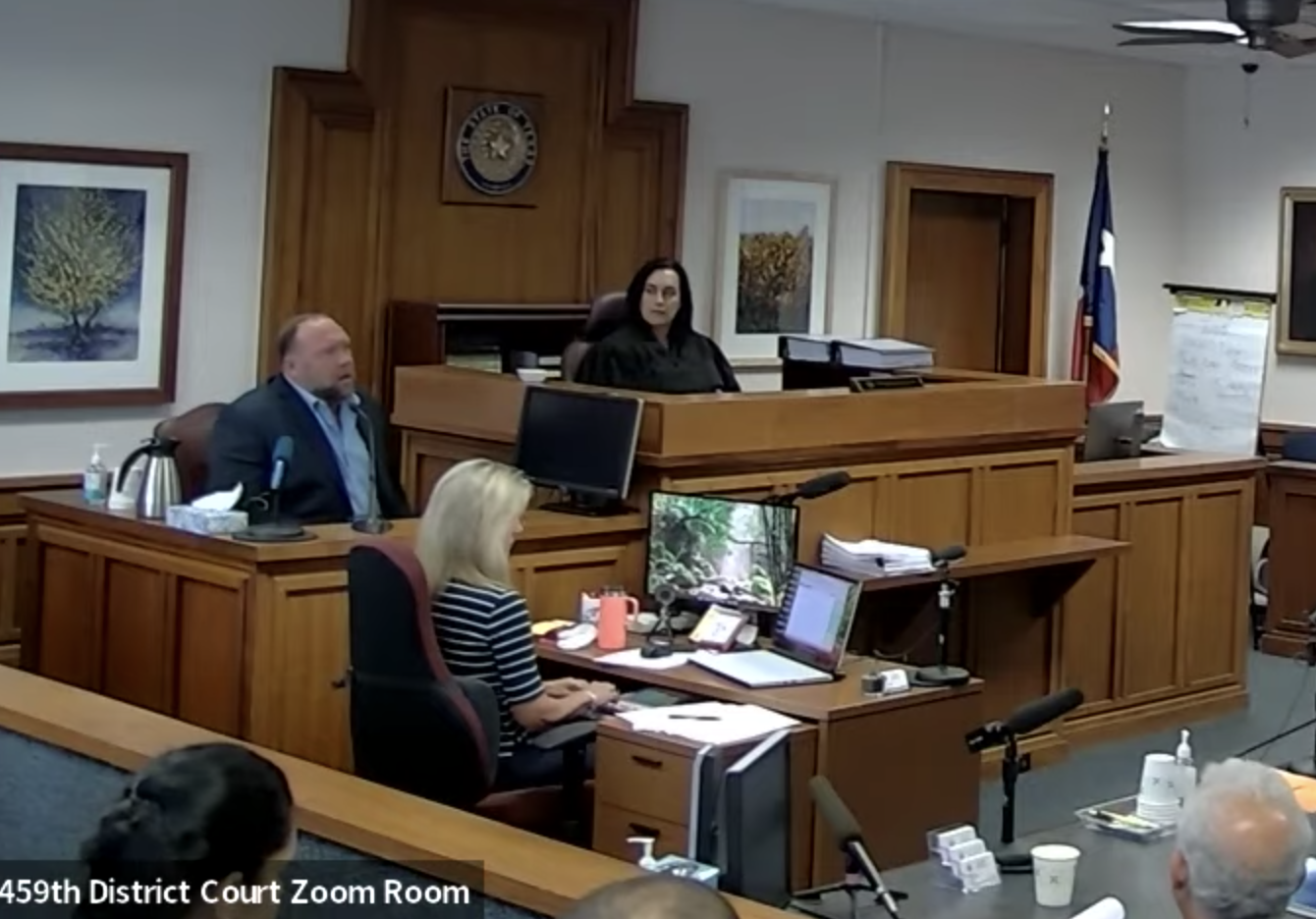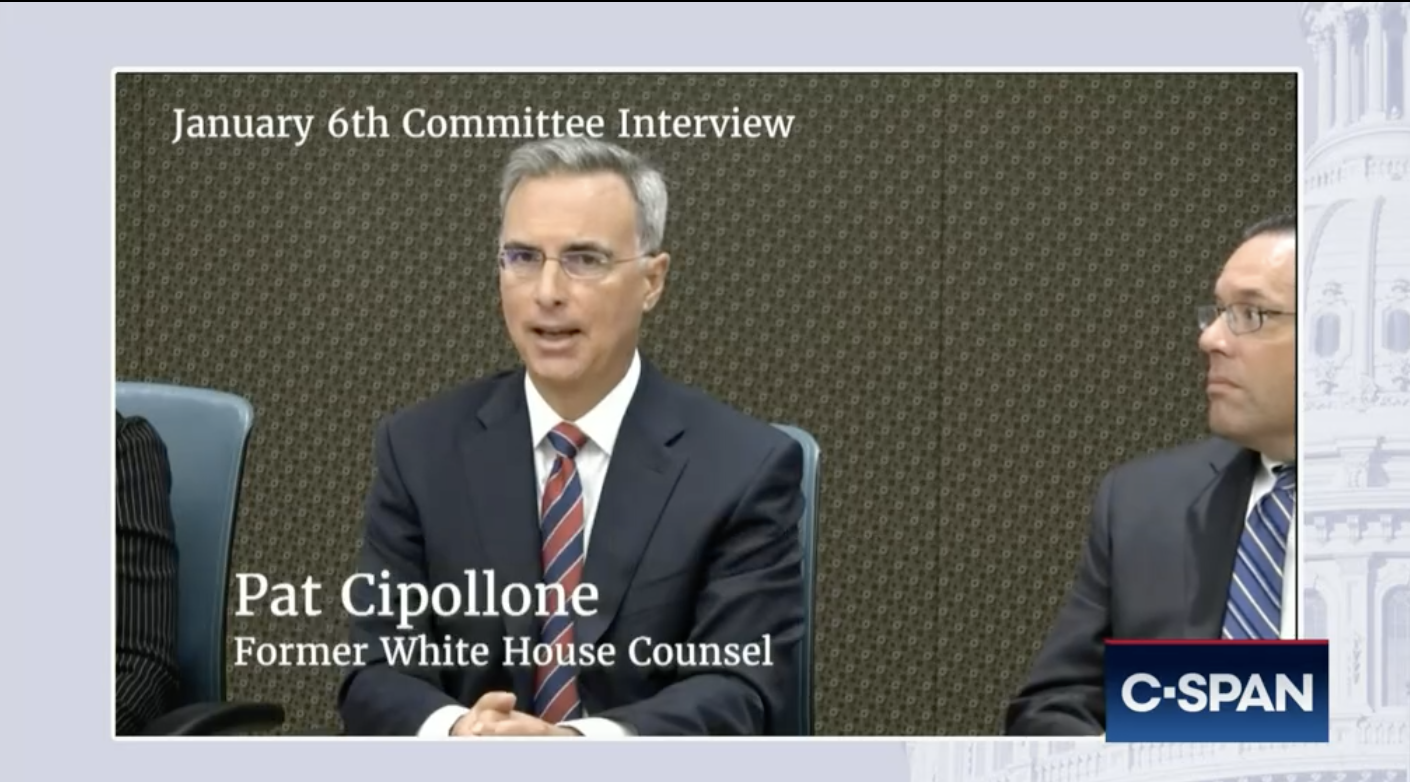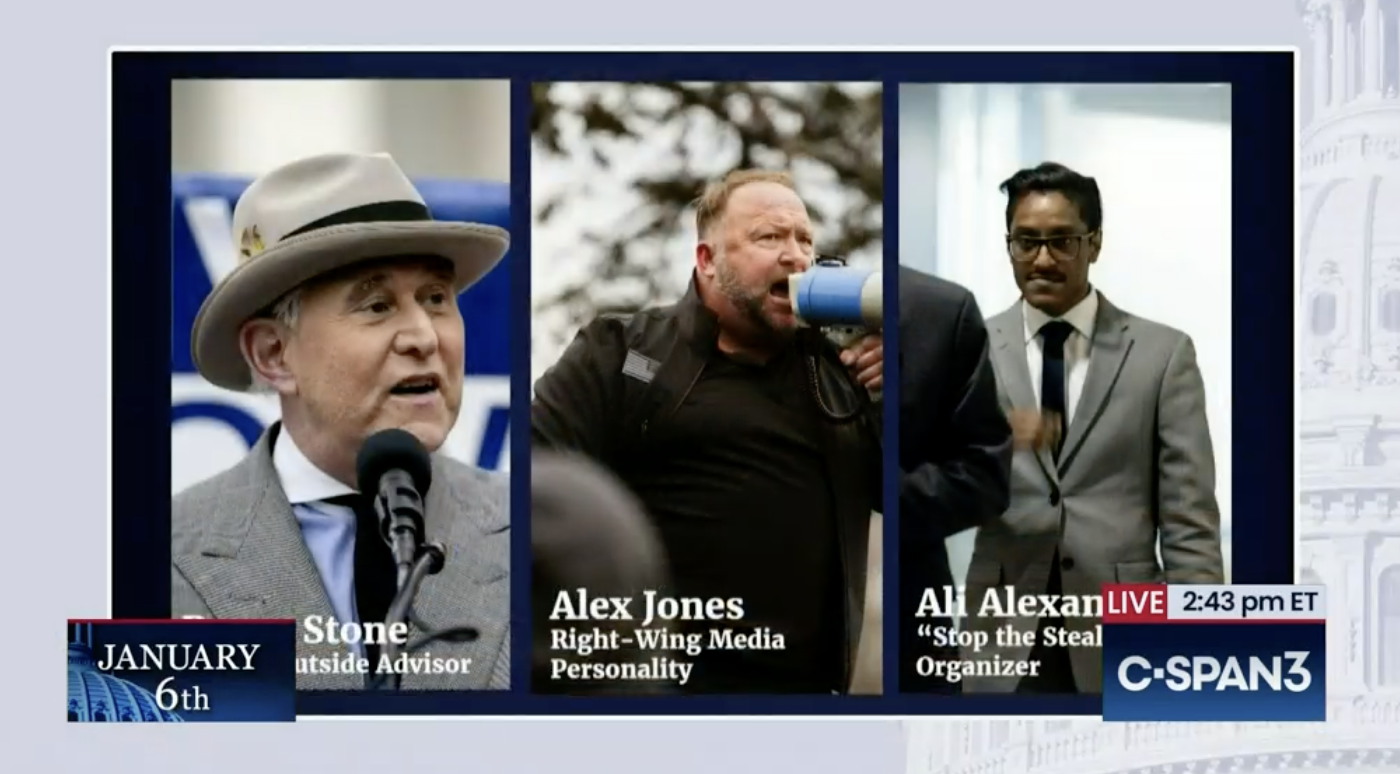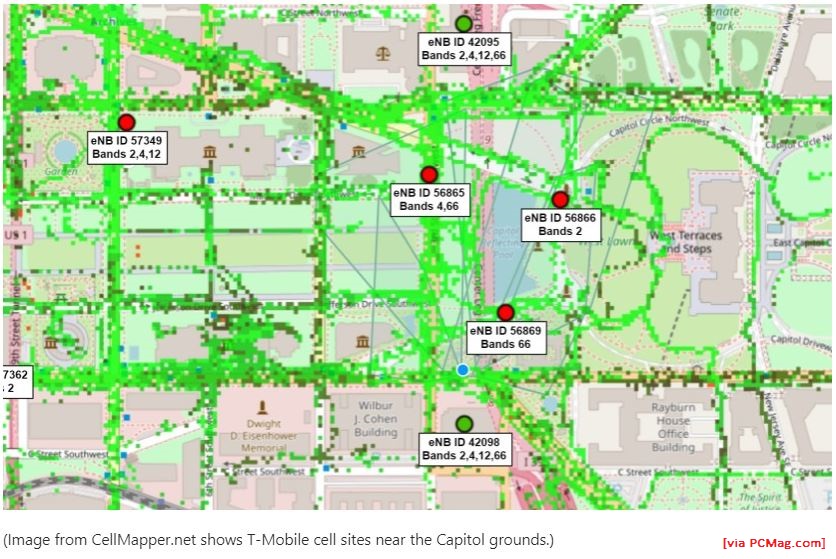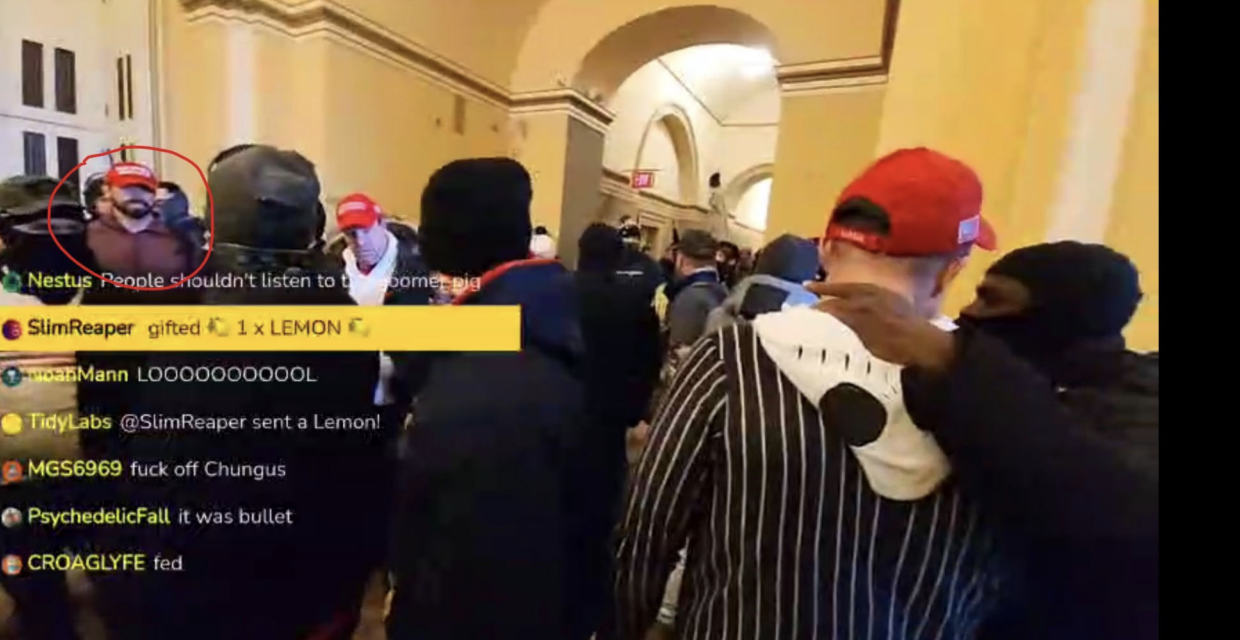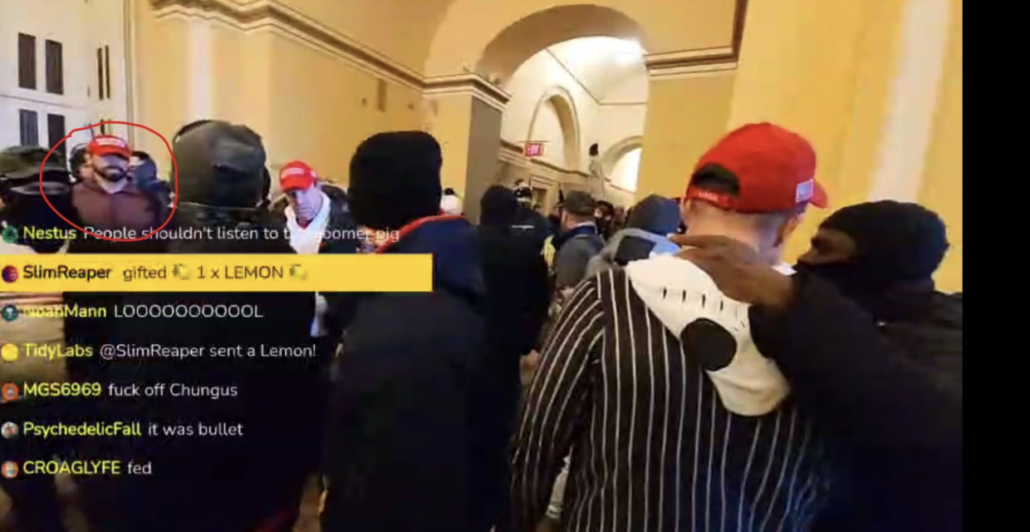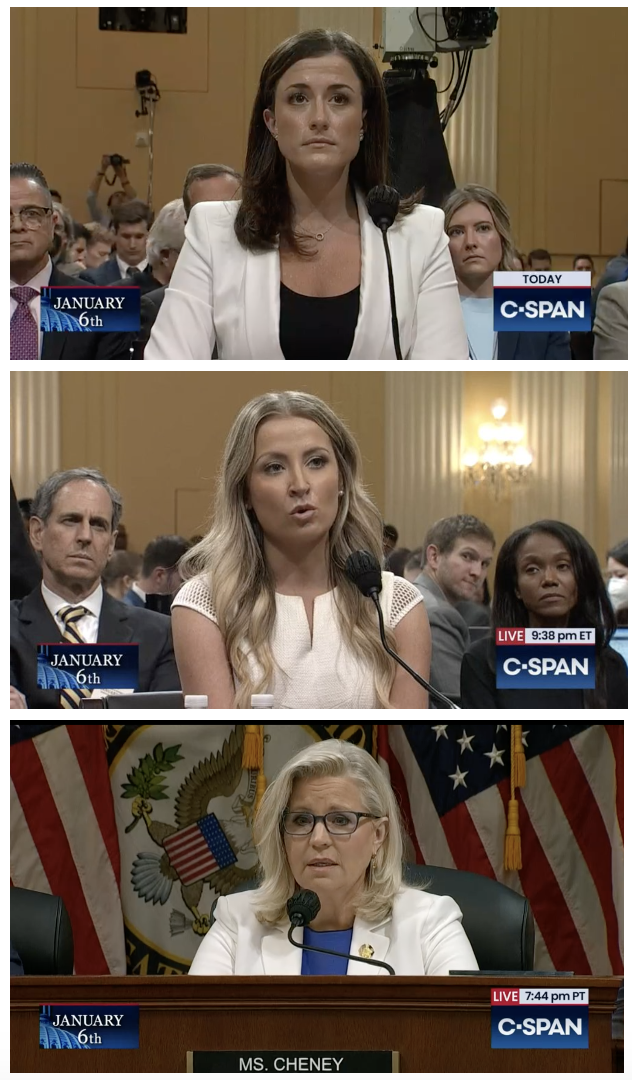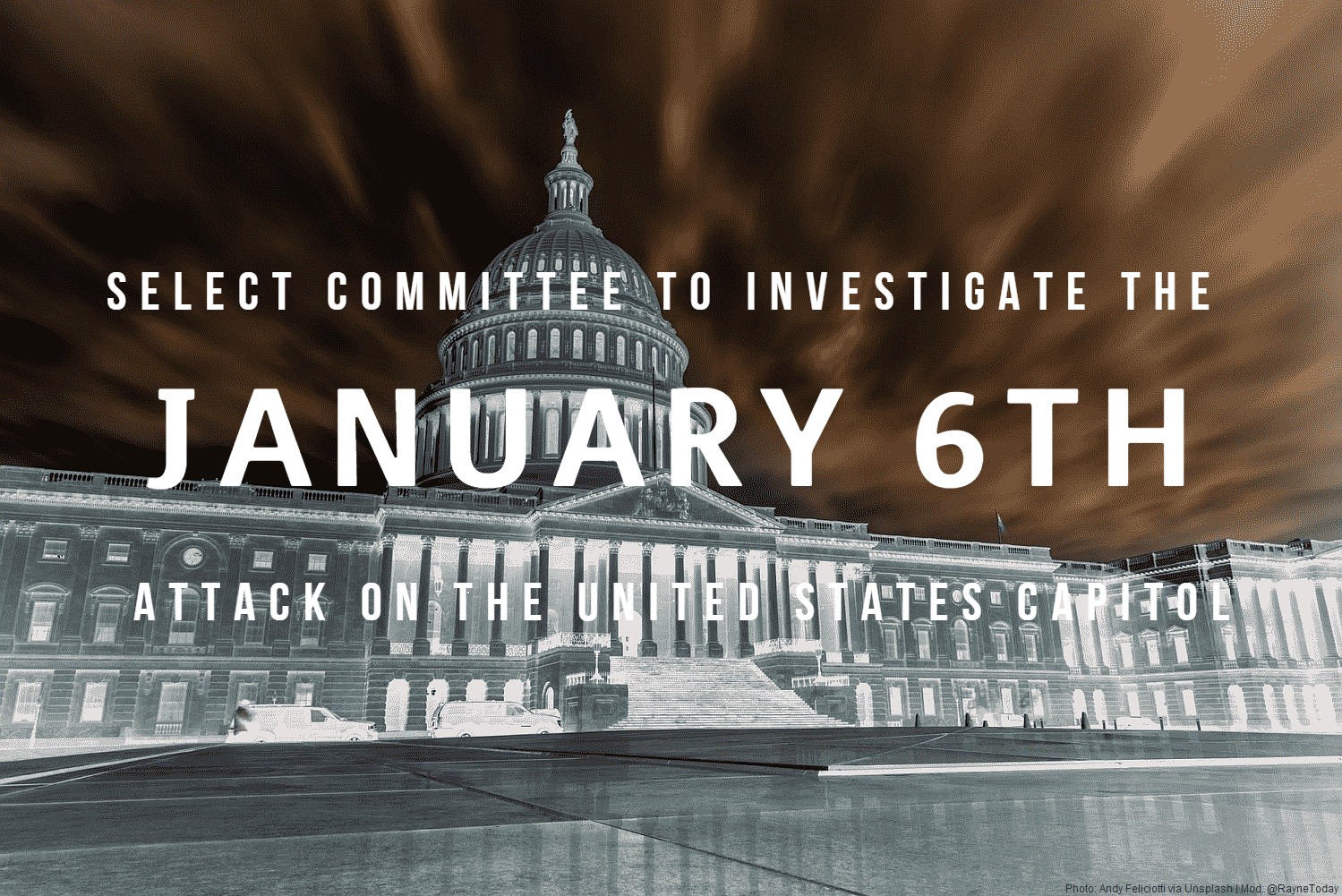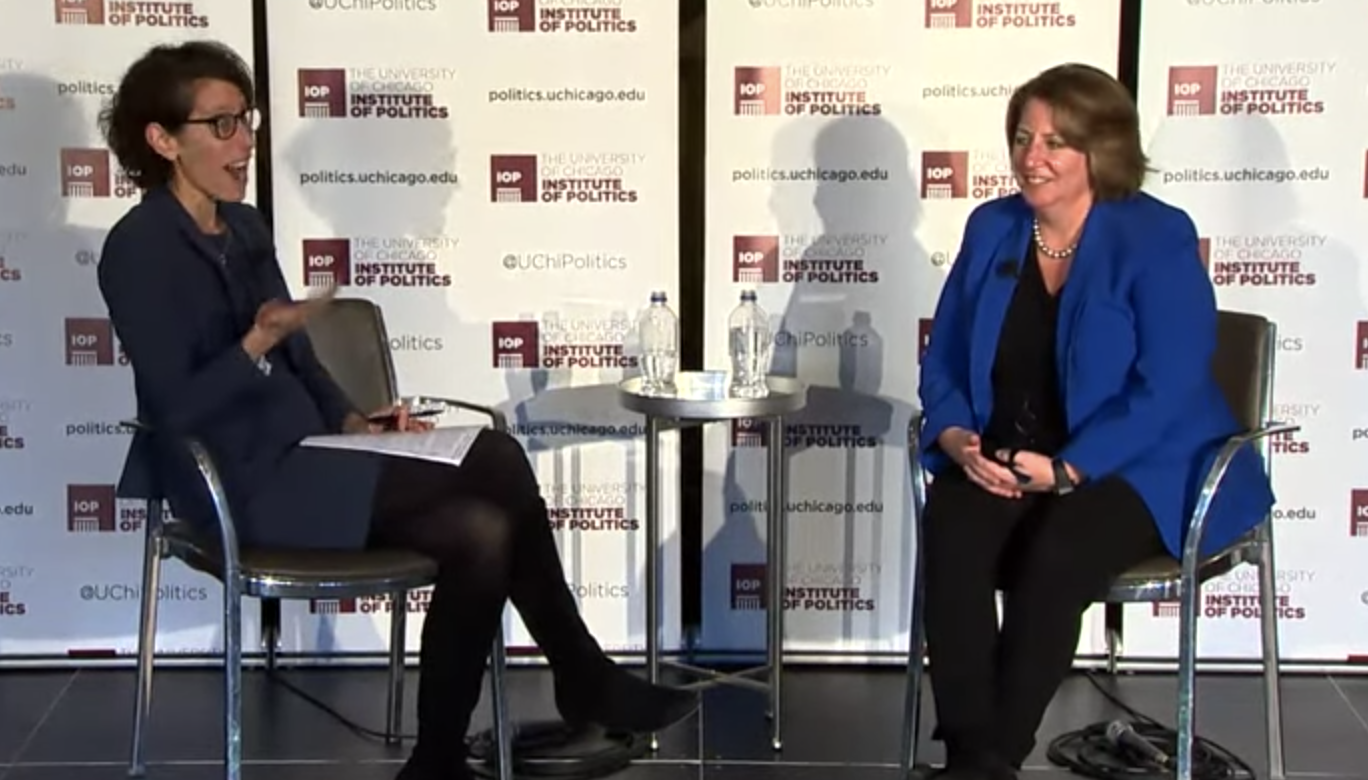Fresh off giving Andrew Weissmann a platform to complain that DOJ’s multi-spoked investigation into January 6 should be multi-spoked, fresh off giving Adam Schiff an opportunity to make the (still-uncorrected) false claim that Congress never gets ahead of DOJ on parts of investigations they’re conducting in parallel, Ari Melber rolled out a schema (one, two) about his understanding of Trump’s corrupt acts that others have found really helpful.
It came with a nifty, mostly-accurate graphic that shows how multiple attempts to stay in power worked in parallel.
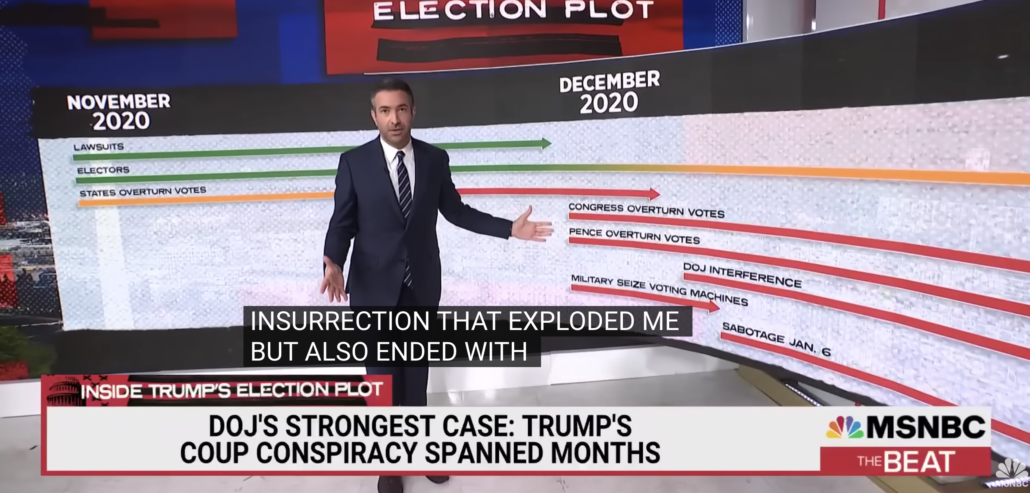
That graphic is helpful for those trying to keep track of all the efforts Trump pursued.
But Ari’s “special report,” which he claims is “built on evidence, not anything but evidence,” is most useful for demonstrating the evidentiary hole in the middle of his understanding of events leading up to January 6. And not just his understanding: also my own, and (at least based off their hearings) even the January 6 Committee’s. Neither Ari, the Committee, nor I, nor anyone I know to be investigating — save possibly DOJ and one or two really well sourced journalists — knows for certain what happened between the end of the December 18, 2020 meeting where Sidney Powell pitched Trump on a plan to seize voting machines and Trump’s December 19 tweet that led Stop the Steal plotters to start taking steps that led to a violent attack on the Capitol.
Before I lay out how well Ari illustrates that evidentiary hole, there are multiple things that Ari gets wrong (I’ve put my transcription of the most important parts of his presentation below). Most have to do with Ari’s apparent misunderstanding of how the blue collar violent attack on the Capitol related to the white collar parts of the coup attempt he has familiarity with.
For example, he claims, without evidence, that Rudy Giuliani, Mark Meadows, and John Eastman wanted pardons, “totally separate from the January 6 violence.” But according to Cassidy Hutchinson, both Rudy and Meadows knew by January 2 that Trump planned to go to the Capitol and it might get “real, real bad.”
CASSIDY HUTCHINSON: As Mr. Giuliani and I were walking to his vehicles that evening, he looked at me and said something to the effect of, Cass, are you excited for the 6th? It’s going to be a great day. I remember looking at him saying, Rudy, could you explain what’s happening on the 6th? He had responded something to the effect of, we’re going to the Capitol.
It’s going to be great. The President’s going to be there. He’s going to look powerful. He’s — he’s going to be with the members. He’s going to be with the Senators. Talk to the chief about it, talk to the chief about it. He knows about it.
LIZ CHENEY: And did you go back then up to the West Wing and tell Mr. Meadows about your conversation with Mr. Giuliani?
CASSIDY HUTCHINSON: I did. After Mr. Giuliani had left the campus that evening, I went back up to our office and I found Mr. Meadows in his office on the couch. He was scrolling through his phone. I remember leaning against the doorway and saying, I just had an interesting conversation with Rudy, Mark. It sounds like we’re going to go to the Capitol.
He didn’t look up from his phone and said something to the effect of, there’s a lot going on, Cass, but I don’t know. Things might get real, real bad on January 6th.
Hutchinson also tied White House awareness of the militias now charged with seditious conspiracy with Rudy’s presence.
CASSIDY HUTCHINSON: I recall hearing the word Oath Keeper and hearing the word Proud Boys closer to the planning of the January 6th rally when Mr. Giuliani would be around.
As for Eastman, Mike Pence’s Counsel, Greg Jacob, accused Eastman in real time, as his family was worried whether Jacob would get out alive, of causing the “siege” on the Capitol by “whipping large numbers of people into a frenzy over something with no chance of ever attaining legal force through actual process of law.”
[T]hanks to your bullshit, we are now under siege.
[snip]
[I]t was gravely, gravely irresponsible of you to entice the President of with an academic theory that had no legal viability, and that you well know we would lose before any judge who heard and decided the case. And if the courts declined to hear it, I suppose it could only be decided in the streets. The knowing amplification of that theory through numerous surrogates, whipping large numbers of people into a frenzy over something with no chance of ever attaining legal force through actual process of law, has led us to where we are.
Judge David Carter’s opinion finding it likely Eastman and Trump conspired to obstruct the vote count included Trump’s effort to send the mob, which we now know he knew to be armed, to the Capitol.
President Trump ended his speech by galvanizing the crowd to join him in enacting the plan: “[L]et’s walk down Pennsylvania Avenue” to give Vice President Pence and Congress “the kind of pride and boldness that they need to take back our country.”218
So all of these three men, per key witnesses and one judge, have legal exposure that is directly tied to the violence at the Capitol. Maybe they only wanted pardons for their white collar crimes, but — according to the evidence — all are implicated in the blue collar crimes.
Ari also treats the consideration of a plan to have DOD seize the voting machines as “the military plot,” one that ended on December 18. There are two problems with this. First, Ari ignores that this plan was revised to put DHS in charge of seizing the machines, which is how the plan resurfaced on December 31, when Trump serially tried to get DOJ and DHS to seize the machines.
ADAM KINZINGER: Mr. Rosen, the President asked you to seize voting machines from state governments. What was your response to that request?
JEFFREY A. ROSEN: That we had — we had seen nothing improper with regard to the voting machines. And I told him that the — the real experts that had been at DHS and they had briefed us, that they had looked at it and that there was nothing wrong with the — the voting machines. And so that was not something that was appropriate to do.
ADAM KINZINGER: There would be no factual basis to seize machines. Mr. Donoghue —
JEFFREY A. ROSEN: — I — I don’t think there was legal authority either.
ADAM KINZINGER: Yeah. Mr. Donohue can you explain what the President did after he was told that the Justice Department would not seize voting machines?
RICHARD DONOGHUE: The President was very agitated by the Acting Attorney General’s response. And to the extent that machines and — and the technology was being discussed, the Acting Attorney General said that the DHS, Department of Homeland Security, has expertise in machines and certifying them and making sure that the states are operating them properly.
And since DHS had been mentioned, the President yelled out to his Secretary get Ken Cuccinelli on the phone. And she did in very short order. Mr. Cuccinelli was on the phone. He was the number two at DHS at the time. It was on the speakerphone, and the President essentially said, Ken, I’m sitting here with the Acting Attorney General.
He just told me it’s your job to seize machines and you’re not doing your job. And Mr. Cuccinelli responded.
More importantly, Ari ignores that both militias charged with sedition and a goodly number of other armed rioters believed that larger scale violence would break out (possibly via clashes with counter-protestors, possibly in response to the GOP attempt to steal votes at the Capitol) on January 6, which would create the excuse for Trump to invoke the Insurrection Act to accord legal authority to the mob to act on his behalf. That will literally be Stewart Rhodes’ defense against a sedition charge, that he expected his attack on the US to come with Trump’s legal sanction.
And the plan may have gone further than that. To the extent that Trump asked the National Guard to be prepared for January 6, it was to protect his supporters, not to protect the Capitol.
Mr. Meadows sent an email to an individual about the events on January 6 and said that the National Guard would be present to ‘‘protect pro Trump people’’ and that many more would be available on standby.
When reports that the Guard would deploy first started to come out on January 6, Proud Boy Charles Donohoe [now a cooperating witness] reacted with surprise that the Guard would attack, rather than protect, Trump supporters.
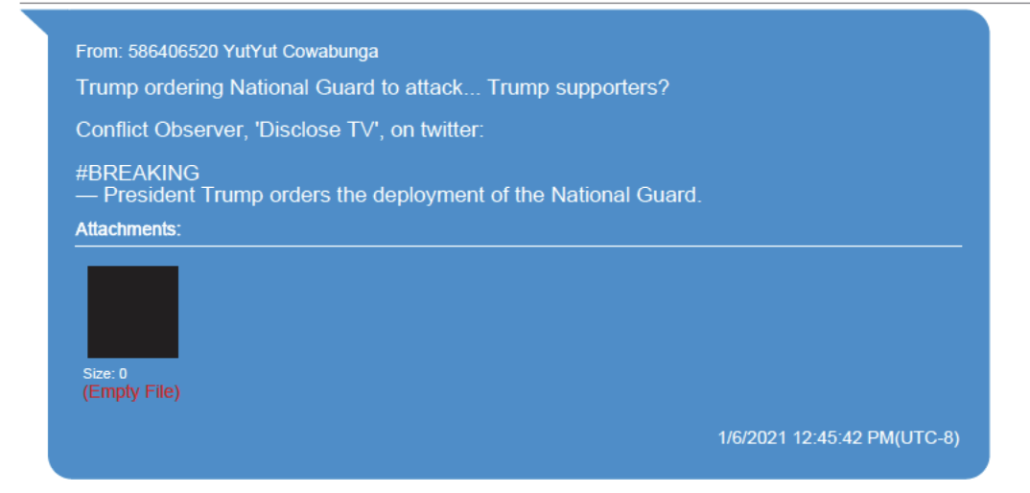
That is, the actual plans for a military coup, rather than a Sidney Powell plan that Trump rejected then revisited, envisioned having armed Trump supporters and the National Guard holding the Capitol together. It was a plan that multiple militia members — most notably Rhodes, which forms a key part of the sedition evidence against him — but even joined by some members of Congress continued to pursue after January 6. There was a military plot that was far worse than the one that Ari labels as “that very bad red illegal plan,” but to understand it, you need to understand what happened at the Capitol, and what plans continued for weeks — still continue!! — after, per Ari, the violence “ended within one day.”
On top of a lack of understanding of what actually happened at the Capitol, Ari’s scheme includes conflicting claims. Ari claims that after Trump chose not to pursue Sidney Powell’s plan on December 18, he turned to “muscle.” “So that’s when I bring muscle to January 6.” His nifty graphic shows the plans to “sabotage Jan. 6” (adopting an utterly bizarre word, “sabotage,” which whitewashes both the violence planned and the legal crime, obstruction, committed) started right then, on December 19. But then, after claiming that Trump turned to “muscle” starting on December 19, Ari suggests that Trump’s only agency in the violence that ensued was the speech he gave on January 6. “The law makes it hard to pin an insurrection on one speech.”
In his presentation, at least, Ari ignores that “muscle” had been a part of the plan from the start, with operatives forming mobs at counting locations in the swing states that in turn created the cover for the fake electors plot and elicited threats against election officials, and it continued through to January 6 and beyond.
This may stem from an unfortunate unevenness on the part of the January 6 Committee.
The seventh hearing — the one purportedly focused on the rioters — depicted the actions of Ali Alexander and Alex Jones as an organic response to Trump’s December 19 tweet.
Donald Trump issued a tweet that would galvanize his followers, unleash a political firestorm, and change the course of our history as a country. Trump’s purpose was to mobilize a crowd. And how do you mobilize a crowd in 2020? With millions of followers on Twitter, President Trump knew exactly how to do it. At 1:42 AM on December 19, 2020, shortly after the last participants left the unhinged meeting, Trump sent out the tweet with his explosive invitation.
Trump repeated his big lie and claimed it was “statistically impossible to have lost the 2020 election” before calling for a big protest in DC on January 6th, be there, will be wild. Trump supporters responded immediately. Women for America First, a pro-Trump organizing group, had previously applied for a rally permit for January 22nd and 23rd in Washington, DC, several days after Joe Biden was to be inaugurated.
But in the hours after the tweet, they moved their permit to January 6th, two weeks before. This rescheduling created the rally where Trump would eventually speak. The next day, Ali Alexander, leader of the Stop the Steal organization and a key mobilizer of Trump supporters, registered Wildprotest.com, named after Trump’s tweet.
Wildprotest.com provided comprehensive information about numerous newly organized protest events in Washington. It included event times, places, speakers, and details on transportation to Washington DC. Meanwhile, other key Trump supporters, including far right media personalities, began promoting the wild protest on January 6th. [Begin videotape]
ALEX JONES: It’s Saturday, December 19th. The year is 2020, and one of the most historic events in American history has just taken place. President Trump, in the early morning hours today, tweeted that he wants the American people to march on Washington DC on January 6th, 2021.
That hearing similarly implied that Oath Keeper Kelly Meggs’ efforts to set up an alliance between the militias, which undoubtedly started at least days earlier, was a response to Trump’s tweet.
On December 19th at 10:22 a.m., just hours after President Trump’s tweet, Kelly Meggs, the head of the Florida Oath Keepers, declared an alliance among the Oath Keepers, the Proud Boys and the Florida Three Percenters, another militia group.
He wrote, we have decided to work together and shut this shit down. Phone records obtained by the Select Committee show that later that afternoon, Mr. Meggs called Proud Boys leader Enrique Tarrio, and they spoke for several minutes. The very next day, the Proud Boys got to work. The Proud Boys launched an encrypted chat called the Ministry of Self-defense.
That is, in places, the Committee encouraged this notion that everything pivoted on December 19 after that tweet.
But elsewhere, the Committee made it clear that the “muscle” and the militia were part of the plan from the start. Its fourth hearing on the Big Lie, for example, made clear that the earlier mobs were led by the very same people who seemingly sprung to action in response to Trump’s December 19 tweet.
[Ali Alexander]:
Let us in. Let us in. Let us in. Special session. Special session. Special session. We’ll light the whole shit on fire.
NICK FUENTES:
What are we going to do? What can you and I do to a state legislator besides kill him? Although, we should not do that. I’m not advising that, but I mean what else can you do? Right?
UNKNOWN:
The punishment for treason is death.
[End Videotape]
ADAM SCHIFF:
The state pressure campaign and the danger it posed to state officials and to State Capitols around the nation was a dangerous precursor to the violence we saw on January 6th at the US Capitol.
[snip]
The Select Committee has uncovered evidence in the course of our investigation that at stop the steal protests at state capitols across the country, there were individuals with ties to the groups or parties involved in the January 6th attack on the US Capitol. One of those incursions took place in the Arizona House of Representatives building, as you can see in this footage.
This is previously undisclosed video of protesters illegally entering and refusing to leave the building. One of the individuals prominently shown in this video is Jacob Chansley, perhaps better known as the QAnon Shaman. This rioter entered the Capitol on January 6th, was photographed leaving a threatening note on the dais in the US Senate chamber, and was ultimately sentenced to 41 months in prison after pleading guilty to obstruction of an official proceeding. Other protesters who occupied the Arizona House of Representatives building included — included Proud Boys, while men armed with rifles stood just outside the entrance.
And different parts of the seventh hearing showed that these ties are much better established, including through Roger Stone’s Friends of Stone listserv that started plotting immediately after the election.
Raskin: In the same time frame, Stone communicated with both the Proud Boys and the Oath Keepers regularly. The committee obtained encrypted content from a group – – from a group chat called Friends of Stone, FOS, which included Stone, Rhodes, Tarrio and Ali Alexander.
The chat focused on various pro-Trump events in November and December of 2020, as well as January 6th. As you can see here, Stewart Rhodes himself urged the Friends of Stone to have people go to their state capitols if they could not make it to Washington for the first million MAGA March on November 14th. These friends of Roger Stone had a significant presence at multiple pro-Trump events after the election, including in Washington on December the 12th. On that day, Stewart Rhodes called for Donald Trump to invoke martial law, promising bloodshed if he did not.
[snip]
JAMIE RASKIN: Encrypted chats obtained by the Select Committee show that Kelly Meggs, the indicted leader of the Florida Oath Keepers, spoke directly with Roger Stone about security on January 5th and 6th. In fact, on January 6th, Stone was guarded by two Oath Keepers who have since been criminally indicted for seditious conspiracy.
One of them later pleaded guilty and, according to the Department of Justice, admitted that the Oath Keepers were ready to use, quote, lethal force if necessary against anyone who tried to remove President Trump from the White House, including the National Guard. As we’ve seen, the Proud Boys were also part of the Friends of Stone Network.
Stone’s ties to the Proud Boys go back many years. He’s even taken their so-called fraternity creed required for the first level of initiation to the group.
[snip]
Katrina Pierson, one of the organizers of January 6th rally and a former campaign spokeswoman for President Trump, grew increasingly apprehensive after learning that multiple activists had been proposed as speakers for the January 6th rally. These included some of the people we discussed earlier in this hearing.
Roger Stone, a longtime outside advisor to President Trump; Alex Jones, the founder of the conspiracy theory website Infowars; and Ali Alexander, an activist known for his violent political rhetoric. On December 30th, Miss Pierson exchanged text messages with another key rally organizer about why people like Mr. Alexander and Mr. Jones were being suggested as speakers at the President’s rally on January 6th. Ms. Pierson’s explanation was POTUS, and she remarks that the President likes the crazies.
Remember that the Committee cut a good deal of their presentation focused on the militia in that seventh hearing to integrate more of Pat Cipollone’s testimony, which I think was one of the more unsuccessful planning decisions the Committee made.
Even still, taken as a whole, the Committee shows that the network around Roger Stone, which linked Ali Alexander, Alex Jones, and other movement activists to the militias (Jones had his own long-standing ties to the militias, including his former employee Joe Biggs), was riling up crowds starting immediately after the election, took concrete steps seemingly in response to Trump’s December 19 tweet, and continued to do so on January 6.
I mean, Roger Stone has been doing this since 2000.
In his most recent schema at least, Ari ignores all of that. Stone, Alexander, the militias, go unmentioned, and Trump’s role in the violence is limited to a single speech.
Which brings me back to the evidentiary gap that Ari and I share, seemingly in conjunction with the Committee.
In Ari’s telling, Donald Trump and Peter Navarro (with whom Ari has had a series of interviews) are the agents of this timeline. In his telling, Trump made an effort to “find a coup plotter” who would go further than his personal lawyer Rudy, who at least according to Hutchinson, had ties to the militias (though Powell is currently funding the legal defense of several Oath Keepers). Ari claimed that Powell was still on the campaign team, even though Rudy had explicitly and publicly stated she had no role on the campaign as early as November 22.
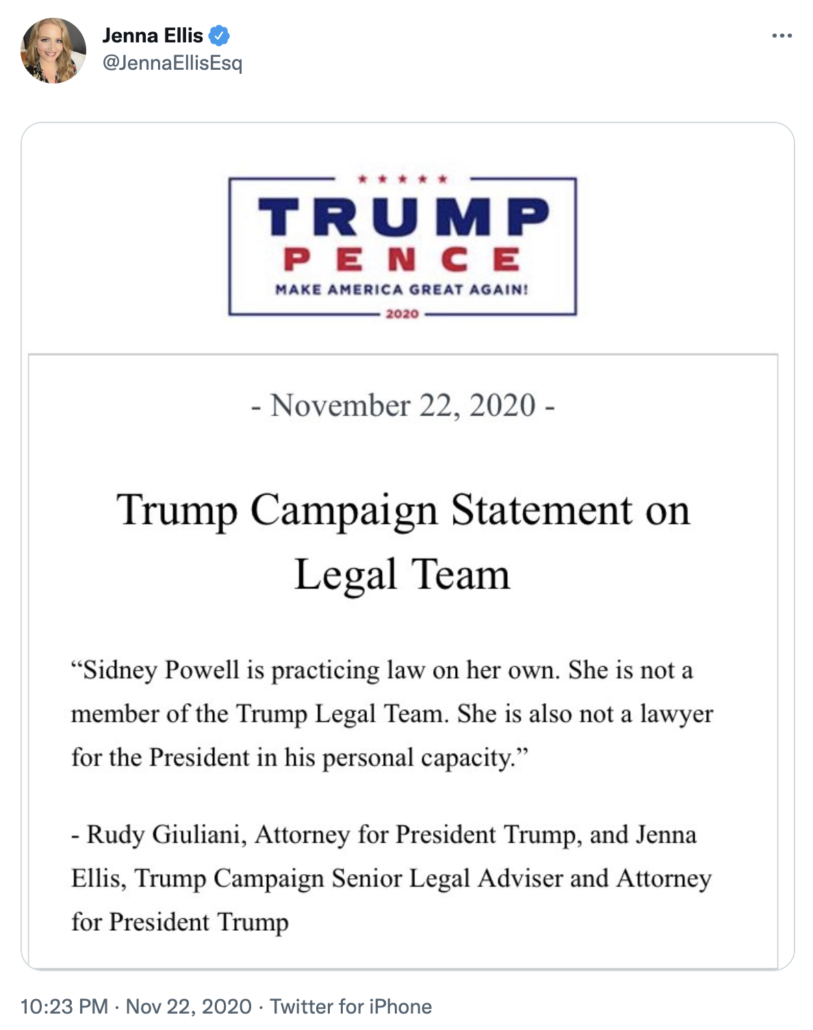
And Ari suggested that Trump adopted Powell’s plan, then either “back[ed] down” or “quit” it.
But as the January 6 Committee described it, it’s not really clear what happened; Pat Cipollone couldn’t even say whether Powell was appointed Special Counsel.
PAT CIPOLLONE: I don’t know what her understanding of whether she had been appointed, what she had been appointed to, Ok? In my view, she hadn’t been appointed to anything and ultimately wasn’t appointed to anything, because there had to be other steps taken. And that was my view when I left the meeting. But she may have a different view, and others may have a different view, and — and the president may have a different view.
To make matters worse, there are few if any credible witnesses here. Sidney Powell and her entourage (including Patrick Byrne, Mike Flynn, and an unnamed attorney) are batshit insane. So is Rudy. Cipollone, who gets treated as a grown-up, seems to be protecting Trump with his privilege claims. Meadows showed up later, but he’s a liar. Cassidy Hutchinson was texting details about the screaming and took a picture of Meadows escorting Rudy from the premises, but she is not known to have been in the meeting.
What seems common to all descriptions is that the Powell entourage showed up without an appointment and were let in by (as Ari notes) Peter Navarro aide Garrett Ziegler, though Patrick Byrne’s account describes two others being involved in their unplanned entry as well. That’s not a plan, it’s a pitch.
During the course of the meeting, Trump entertained the Powell plan because, he complained, Rudy and others were offering him nothing better.
UNKNOWN: So one of the other things that’s been reported that was said during this meeting was that President Trump told White House lawyers Mr. Herschmann and Mr. Cipollone that they weren’t offering him any solutions, but Ms. Powell and others were. So why not try what Ms. Powell and others were proposing? Do you remember anything along those lines being said by President Trump?
DEREK LYONS: I do. That sounds right.
ERIC HERSCHMANN: I think that it got to the point where the screaming was completely, completely out there. I mean, you got people walk in, it was late at night, had been a long day. And what they were proposing I thought was nuts.
RUDY GIULIANI: I’m gonna — I’m gonna categorically describe it as you guys are not tough enough. Or maybe I put it another way. You’re a bunch of pussies. Excuse the expression, but that — that’s I — I’m almost certain the word was used.
But the impression given by virtually all versions of this story (key versions linked below) is that by the end of the night, the White House lawyers and Rudy had mostly convinced Trump not to adopt this plan.
- December 19, 2021: NYT, Trump Weighed Naming Election Conspiracy Theorist as Special Counsel
- December 21, 2021: CNN, Heated Oval Office meeting included talk of special counsel, martial law as Trump advisers clash
- January 31, 2021: NYT, Trump Had Role in Weighing Proposals to Seize Voting Machines
- February 1, 2021: Patrick Byrne, How DJT Lost the White House, Chapter 3: Crashing the White House (December 18-22)
- February 1, 2021: Exclusive: Trump advisers drafted more than one executive order to seize voting machines, sources tell CNN
- February 2, 2021: Jonathan Swan, Bonus episode: Inside the craziest meeting of the Trump presidency
- July 12, 2022: January 6 Committee hearing
If that’s the case (and several people have backed that story under oath), this will be exculpatory if and when Trump ever goes to trial, not inculpatory. Entertaining a suspect idea — even the arguably legal one of appointing Jeffrey Clark to more aggressively pursue voter fraud claims, and especially a plan to seize the poll machines — but rejecting it on the advice of lawyers, even if Trump was persuaded to do so largely out of self-interest, is evidence someone is trying to stay inside the law, not break it. To be sure, there’s plenty of other evidence that Trump knowingly broke the law, but some of the most contentious meetings will actually be used in his defense. That just means prosecutors will find their proof of motive in places more directly tied to the crimes.
But the meeting accounts showing lawyers at least stalling on any decision about seizing the machines is where the trail goes dark.
No one has yet explained what happened between the time everyone left and the moment Trump’s tweet went out, and the understanding with which key planners adjusted their own timelines. Instead, we get narratives like Ari’s, or Jamie Raskin’s, that present the timing as proof that Trump took a third alternative — a pretty strong inference, undoubtedly — without an explanation of how the tweet got sent out or whether those involved knew where things would lead or who pitched Trump.
Not long after Sidney Powell, General Flynn, and Rudy Giuliani — Giuliani left the White House in the early hours of the morning, President Trump turned away from both his outside advisers’ most outlandish and unworkable schemes and his White House counsel’s advice to swallow hard and accept the reality of his loss.
Instead, Donald Trump issued a tweet that would galvanize his followers, unleash a political firestorm, and change the course of our history as a country. Trump’s purpose was to mobilize a crowd. And how do you mobilize a crowd in 2020? With millions of followers on Twitter, President Trump knew exactly how to do it. At 1:42 AM on December 19, 2020, shortly after the last participants left the unhinged meeting, Trump sent out the tweet with his explosive invitation.
Trump repeated his big lie and claimed it was “statistically impossible to have lost the 2020 election” before calling for a big protest in DC on January 6th, be there, will be wild. Trump supporters responded immediately. Women for America First, a pro-Trump organizing group, had previously applied for a rally permit for January 22nd and 23rd in Washington, DC, several days after Joe Biden was to be inaugurated.
But in the hours after the tweet, they moved their permit to January 6th, two weeks before. This rescheduling created the rally where Trump would eventually speak. The next day, Ali Alexander, leader of the Stop the Steal organization and a key mobilizer of Trump supporters, registered Wildprotest.com, named after Trump’s tweet.
Wildprotest.com provided comprehensive information about numerous newly organized protest events in Washington. It included event times, places, speakers, and details on transportation to Washington DC. Meanwhile, other key Trump supporters, including far right media personalities, began promoting the wild protest on January 6th. [Begin videotape]
It appears that both Powell’s contingent and Rudy left after midnight, with Meadows and Rudy together alone as Rudy left. Less than two hours later, that tweet went out, a tweet that was demonstrably central to both the organized and disorganized mobilization of the mob, one that has long been a focus of DOJ’s prosecutions (proof, among other proof, that Ari’s claim that DOJ has only focused on January 6 and the days immediately before it is false).
It’s certainly possible that after everyone left Peter Navarro came in, or maybe just Ziegler, and presented an alternative plan, a mob, but Ari presents no evidence that happened and it’s unlikely either Ziegler or Navarro would have been silent about their role in it. It’s more likely that Rudy and Meadows agreed they had to offer Trump another alternative, and they settled on January 6 (certainly, Meadows had advanced knowledge of Rudy’s plans for January 6). It’s possible that Trump had a late night call with someone else — Roger Stone or Bannon, maybe — who operationalized what came next. Maybe the dim-witted Meadows came up with the plan by himself.
Meadows, who refused to cooperate with the Committee, surely knows. Dan Scavino, who refused to cooperate, spent four years knowing what led up to most every tweet that Trump sent out. He also must know.
And while Ari doesn’t appear to know and I don’t either and the Committee doesn’t explain it if they know the answer, the one other place one might learn the answer is from those who turned existing infrastructure — the Stop the Steal effort, the permits — towards planning for January 6 (both of which DOJ has issued grand jury subpoenas to learn).
DOJ has been a bit coy about whether they know. That’s why I pointed to the remarkable use of the passive voice in Donohoe’s statement of offense in April, which virtually alone among January 6 filings obscures Trump’s role in announcing the riot on December 19, then turns immediately to Enrique Tarrio’s very hierarchical plan to instill discipline in the Proud Boys that didn’t exist at the December 12 MAGA March (the same trip to DC where Tarrio visited the White House as part of a Latinos for Trump visit).
On December 19, 2020, plans were announced for a protest event in Washington, D.C., on January 6, 2021, which protest would coincide with Congress’s certification of the Electoral College vote.
On or before December 20, 2020, Tarrio approached Donohoe and solicited his interest in joining the leadership of a new chapter of the Proud Boys, called the Ministry of Self Defense (“MOSD”). Donohoe understood from Tarrio that the new chapter would be focused on the planning and execution of national rallies and would consist of hand-selected “rally” boys. Donohoe felt privileged to be included and agreed to participate.
That happened “on or before” December 20, allowing for the possibility that the Proud Boys started to plan before Trump publicly announced the rally. Among other communications that DOJ likely has that the Committee has more limited access to are at least three versions of the Friends of Stone listserv (from Tarrio, Rhodes, and Owen Shroyer’s phones).
My instinct — based on all the evidence that these same people had been the muscle going back to the election — is that that’s where one could find the answer: Meadows, Scavino, Trump, Rudy, but also those who directed existing infrastructure towards January 6. But that’s just instinct. We still really don’t know for sure.
Presidents often adopt the plans of the last person in the room, and that’s probably more true with Trump than many of his predecessors. We know — or believe — that Sidney Powell and Rudy both left. Which means we don’t know who pitched Trump on the plan he ultimately adopted, the one that led directly to an attack on the Capitol.
There absolutely is a slew of evidence that that tweet made the difference, not just with the militias, but with disorganized conspirators and individuals who took Trump’s tweet as an order to make travel plans. It is absolutely the case that after that meeting, Trump took a fateful step (though that has been clear for at least a year). We just don’t know what led him to post that tweet.
Many of those people [Rudy, Meadows, Eastman] wanted pardons totally separate from the January 6 violence and that is important as we look at a different plot Trump’s effort to find a coup plotter would who go farther than Giuliani, his lawyer, Sidney Powell. She would go even farther. So the plan was to take her off the campaign team and try to install her inside the government to get the military to seize voting machines.
[snip]
Trump did back down on that very bad red illegal plan. And by the way, quitting an illegal coup would be a good thing, but this was the military plot: another conspiracy’s prong that hits a dead end. And this is key, because facing that dead end, late that same night of December 18th, Trump turned to the other plot pushed by Eastman and Navarro, posting what is by now an infamous tweet that announces the January 6 rally, beginning, quote, Peter Navarro releases 36-page report alleging election fraud ‘more than sufficient’ to swing victory to Trump. That was the lie Trump needed to build on when he summons the people to DC for the first time. Quote, big protest in DC on January 6th. Will be wild. Now that’s the first time Trump ever told supporters there was a place to come join this fight. And none of this happened in isolation. The evidence of Trump’s criminal intent is worse when all the facts are shown about the plot. Trump began the public operation to sabotage January 6 as a certified vote which was criminal, only after hitting this dead end in the failed plot to have the military help a coup. Now his lawyers warned him of the criminal issues here. Of the criminal intent and actions of that military plot. And he still moved, continuously, from that conspiracy to this one. Now, that’s damning evidence if prosecutors are indicting a broader conspiracy. And the White House aide connecting both plots is Navarro whose aide helped sneak in the military plotters there, then, he’s part of Trump’s January 6th announcement.
[A quote about seizing machines, ignores DHS]
This is something that Rudy Giuliani said would land them all in prison. Rudy Giuliani. He’s already lost his law license. We’ll see what else happens to him. But that is the context as we showed tonight: That when that fails, is the same time, the same night, that Donald Trump comes in and says, alright, I can’t abuse military power. I’m even being told by my most aggressive, lawless lawyers — the kind that he apparently prefers — that that’s not gonna work. So that’s when I bring muscle to January 6. But we have had, in this country, in our minds and apparently at the Justice Department as we reported tonight, a fixation on only looking here [post December 19]. On basically the 6th, or the lead-up to the 6th, or a few days out. And that’s understandable, given what we lived through. We’re human beings and the 6th was one of the worst attacks and one of the worst national security crises America has ever faced, from a domestic threat, let alone an incumbent outgoing President. The point tonight, which we’ve built on evidence, not anything but evidence, is that when you actually go all the way back, when you actually understand how this started, and how many different plots were pursued, thwarted, warned about, and then desperately doubled down upon, that goes to the criminal intent. Let me put it simply. Taken separately, some of these plots can be viewed like a gray area, clumsy plans that didn’t occur or the insurrection that exploded but also ended within one day. I’ll tell you something. The law makes it hard to pin an insurrection on one speech. As it should. But taken together, you have the evidence of this wider criminal conspiracy with criminal intent running across weeks if not more. Remember, in court, prosecutors have to prove criminal intent in a moment, just that you meant to do it. This is weeks of that with lawyers warning these were crimes, especially after the legal door was closed in mid-December when the Electoral College voted — everything after that, when it comes to overturning votes and installing fraudulent electors, that’s that illegal red zone. That’s where you see the evidence of several crimes. And taken together? Well, this evidence suggests the question is no longer whether there are any indictable election offenses here, but how prosecutors would explain a failure to indict and enforce the law and how that does risk letting the close call of this documented and attempted multi-prong coup conspiracy turn into a training exercise that American democracy may not survive.


